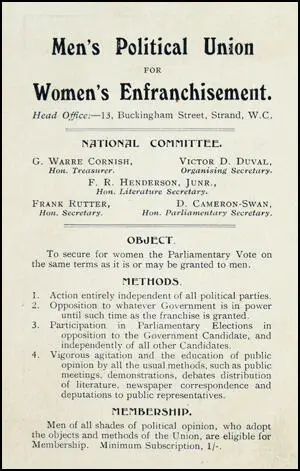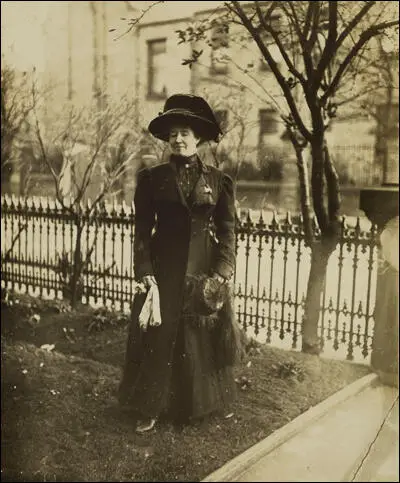Philip Brewster
Philip Brewster, the son of Bertha Lewis Brewster and George Hill Brewster, was born in Henfield, Sussex, on 8th November 1889. His sister, Bertha Brewster, was born two years earlier. His father, John Lewis, was a silk merchant and when he died in 1893 he left effects valued at £110,171. His father, Reverend William Brewster was formerly the incumbent of St Matthew's Church, Toxteth, Liverpool but at the time of his death in Llandudno on 22nd October 1859, he was employed as a "Clerk" and left effects valued at under £3,000. (1)
Bertha and her brother, Brewster attended the progressive boarding school, Bedales. It was founded by John Haden Badley and his wife, Amy Garrett Badley and was the first co-educational boarding school in England. They were socialists, who had been influenced by the writings of William Morris and Edward Carpenter. It has been pointed out that "there are Bedalians who see themselves as left-wing, disapprove of independent schools, and believe passionately in Bedales." (2)
Amy Garrett Badley, a cousin of Elizabeth Garrett Anderson and Millicent Garrett Fawcett was a supporter of women's suffrage, and probably influenced the political views of both Philip and Bertha. Bertha was an outstanding student and "in 1905 was one of the first two girls to leave school to attend London University although no record has been located of her graduating." (3)
Bertha Brewster
Bertha Brewster joined the Women's Social and Political Union (WSPU) in 1909. Brewster, Mary Leigh, Rona Robinson and Theresa Garnett, rented a house close to Sun Hall in Liverpool. On 20th August 1909, the women interrupted a speech made by Richard Haldane the Secretary of State for War. The women climbed onto the roof and Leigh addressed the gathering crowd. The Times described Leigh as "a frail little figure of a woman". (4)
The Liverpool Courier reported that the women "threw bricks and stones through the windows of the Sun Hall with a dexterity which was nothing short of marvellous". (4) After more windows were smashed the police found a window cleaner to get the women down but his ladder was too short and the fire brigade were called. Eventually they managed to bring down the seven women off the roof "in a perilous descent." (5)
Brewster was arrested and after her trial she was sentenced to one month in prison. Five of the women received two months. On their way to Walton Gaol they sang "The Marseillaise", broke the windows of the Black Maria and pushed a "Votes for Women" flag through the ventilator in the roof. The governor of the prison sat alongside the driver, and four policemen rode on the step of the van. (6)
Men's Political Union for Women's Enfranchisement
Philip Brewster was also a supporter of women's suffrage but the Women Social & Political Union (WSPU) did not allow men to join the organisation. On 13th January 1910, Victor Duval and Hugh Franklin formed the Men's Union for Women's Enfranchisement. Duval explained that "The society was formed as a result of a growing conviction among men, as well as women, that the delay in removal of the sex disqualification from the Parliamentary franchise was due to the determined indifference of the Government rather than to any considerable opposition in the country." (7)
In a leaflet published in 1910 the MPU pointed out that it would oppose all governments in power until such time as the franchise is granted. The MPU outlined the methods it would use: "Vigorous agitation and the education of public opinion by all the usual methods, such as public meetings, demonstrations, debates, distribution of literature, newspaper correspondence and deputations to public representatives." (8)

Philip Brewster joined the Men's Union for Women's Enfranchisement. Other members included Henry Nevinson, Hugh Franklin, Gerald Gould, Frederick Pethick-Lawrence, Israel Zangwill, G.D.H. Cole and Henry D. Harben. These men became known as "suffragettes in trousers". (9)
Clara Giveen
Bertha Brewster introduced her brother to her friend Clara Giveen who was also a member of the Women's Social & Political Union (WSPU). Kitty Marion described Giveen as being a "beautiful blonde" of "good family and independent means". (10) On 21 November 1911 Giveen was sentenved to a week in Holloway Prison after being found guilty of holding the bridle of a policeman's horse at a WSPU protest. On 1st March 1912, she was arrested for breaking twelve windows of Jay's women's clothing store in Regent Street. Giveen was sentenced to four months for this offence. (11)
In January 1913, Emmeline Pankhurst made a speech where she stated that it was now clear that Herbert Asquith had no intention to introduce legislation that would give women the vote. She now declared war on the government and took full responsibility for all acts of militancy. "Over the next eighteen months, the WSPU was increasingly driven underground as it engaged in destruction of property, including setting fire to pillar boxes, raising false fire alarms, arson and bombing, attacking art treasures, large-scale window smashing campaigns, the cutting of telegraph and telephone wires, and damaging golf courses". (12)
The WSPU used a secret group called Young Hot Bloods to carry out these acts. No married women were eligible for membership. The existence of the group remained a closely guarded secret until May 1913, when it was uncovered as a result of a conspiracy trial of eight members of the suffragette leadership, including Flora Drummond, Annie Kenney and Rachel Barrett. (13) It has speculated that this group included Clara Giveen, Helen Craggs, Olive Hockin, Kitty Marion, Lilian Lenton, Miriam Pratt, Norah Smyth, Hilda Burkitt, Olive Wharry and Florence Tunks. (14)
Clara Giveen teamed up with Kitty Marion decided that setting fire to the Grand Stand at the Hurst Park racecourse as it "would make a most appropriate beacon". The women returned to a house in Kew owned by Eileen Casey. (15) A police constable who had been detailed to watch the house, saw the two women return and during the course of the next morning they were arrested. (16)
Giveen's local newspaper reported: "One of the two Suffragettes arrested at Kingston charged in connection with the fire which on Monday did £10,000 damage to the stands at Hurst Park racetract was Miss Clara Giveen. Miss Giveen who is a lady of independent means, is known in Bexhill, having been associated for some time with the local branch of the WSPU. When arrested at the residence of Dr Casey, Miss Giveen was found lying on a bed in one of the upper rooms, fully dressed. By her side was a copy of the Suffragette. In her room there was a quantity of resin... Miss Giveen in whose room was found the picture of a house burnt down at Eastbourne, was remanded, bail being allowed." (11)
It seems that the police had been watching the homes of women that had been offering help to those women involved in these arson attacks. "On Tuesday two women, Kitty Marion and Clara Giveen, of independent means, were charged at Richmond with loitering, with intent to commit a felony. A policeman who followed them about various streets at Kew at a quarter past 2 on Monday morning, questioned them, and seen them eventually enter the home of a Dr Casey with a latchkey. A tramcar man identified Marion as being with another women near the racecourse shortly before the fire, and there is other identification evidence. A piece of carpet used to get over the barbed wire of Hurst Park is identified by Marion's landlady as her property." (12)
Their trial began at Guildford on 3rd July. Giveen and Marion were defended by Ian Macpherson, a Liberal Party member of Parliament, who did not call any evidence. "He pleaded to the jury for an unbiased judgment, and to guard against a certain type of female who felt she was being defrauded by the law of the land of what she regarded as a just and proper - the exercise of the vote." Giveen said no evidence should be passed as they had not been tried by their peers. "Until women were on a jury as well as men, no sentence should be passed upon women." (13)
The main evidence against the women involved a fireman called Brown who claimed he saw Marion and Giveen carrying a portmanteau (a large travelling bag). Nearly two hours later he heard a fire hooter and discovered the fire. Soon afterwards he encountered the same woman without the portmanteau. "They were also seen by a tramcar driver named Middleton, who identified Miss Marion. Later the police found tracks leading to the fence bounding the racecourse, and a large piece of Brussels carpet. At the grand stand were found copies of The Suffragette, showing somebody interested in the question had visited it. (14)
Cara Giveen and Kitty Marion were found guilty and sentenced to three years' penal servitude. They both went on hunger strike and after five days were released under the Cat & Mouse Act. (15) They were taken to a Women's Social and Political Union nursing home, and placed under the care of Dr. Flora Murray and Catherine Pine. (16)
On 25th November 1913 Cara Giveen was arrested with Hilda Burkitt for attempting to set fire to the grandstand at the Headingley Football Ground the property of The Leeds Cricket, Football and Athletic Company. The Yorkshire Evening Post reported that Clara Giveen had "escaped from the supervision of the police in Birmingham, to which town she went on Saturday, just before the expiration of her licence." (17)
Marriage
Philip Brewster married Clara Giveen on 8th December 1914, at St Michael's & All Angels Church, Summertown, Oxford. Brewster was a pacifist and became a conscientious objector during the First World War. They were living in Gray's Inn Road when he was conscripted in 1916 and within a month he was convicted for "disobeying in such a manner as to show wilful defiance of authority and lawful command of his superior officer in the execution of his office." He was sentenced to two years' hard labour which was served in Wormwood Scrubs and Wandsworth prisons. He was released in January 1919. (18)

When the General Register of 1939 was compiled, Philip Brewster was recorded with his wife at "Brook Cottage", Peaslake, Surrey. His occupation is given as "Consulting Auto Engineer". His wife died at her home at "Brook Cottage", Peaslake, Surrey. on 16th May 1967. (20)
Philip Brewster of 18 Marford Road, Wheathampstead, Hertfordshire, died on 3rd October 1973 leaving effects valued at £36,073.
Primary Sources
(1) Men's Political Union for Women's Enfranchisement leaflet (January, 1910)
Object: To secure for women the Parliamentary Vote on the same terms as it is or may be granted to men.
Methods: (1) Action entirely independent of all political parties. (2) Opposition to whatever Government is in power until such time as the franchise is granted. (3) Participation in Parliamentary Elections in opposition to the Government candidates, and independently of all other candidates. (4) Vigorous agitation and the education of public opinion by all the usual methods, such as public meetings, demonstrations, debates, distribution of literature, newspaper correspondence and deputations to public representatives.
(2) Diane Atkinson, Rise Up, Women!: The Remarkable Lives of the Suffragettes (2018)
Clara Giveen, born in 1877, married Bertha Brewster's brother, Philip, at Headington on 8 December 1914. Philip Brewster was a conscientious objector. They were living in Gray's Inn Road when he was conscripted in 1916 and within a month he was convicted for "disobeying in such a manner as to show wilful defiance of authority and lawful command of his superior officer in the execution of his office." He was sentenced to two years' hard labour which were served in Wormwood Scrubs and Wandsworth prisons. He was released in January 1919.

